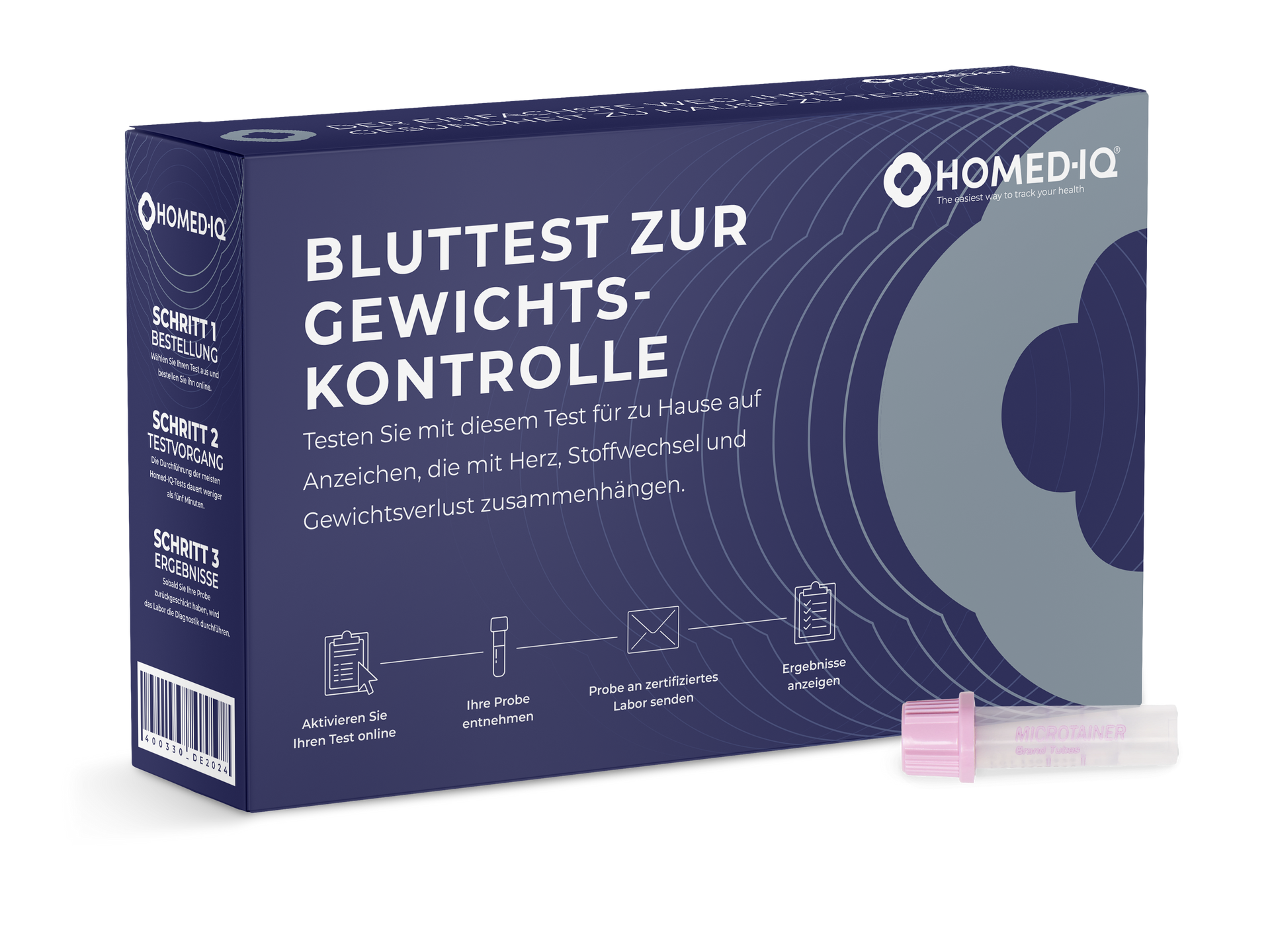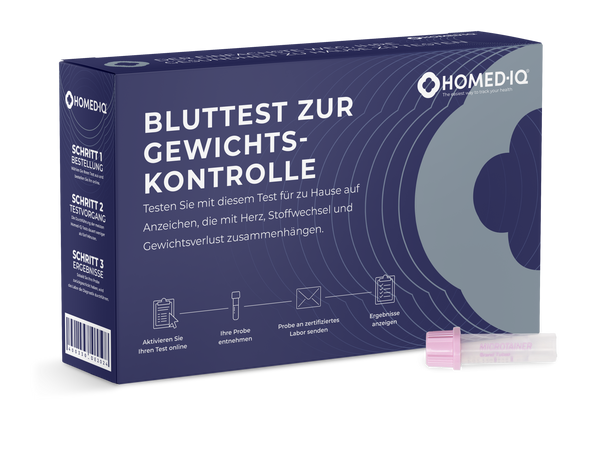Weight Balance Test
FREE SHIPPING TO
Are you on a mission to lose weight or improve your health? The Weight Balance Test can help support your journey toward a healthier you. This test checks several health indicators that are often closely related to diet, weight, and lifestyle. Additionally, it measures TSH, an indicator of thyroid function that could affect weight loss results. Take a proactive approach to your health and track changes over time with the Weight Balance Test.
Test mode:
Finger Prick test
What do we test for?
About Cholesterol
Cholesterol is produced in the liver and is found in every cell of the body. There are two types of cholesterol: one in the form of HDL (high-density cholesterol) and LDL (low-density cholesterol). HDL is also referred to as the ‘good’ cholesterol and LDL is known as the ‘bad’ cholesterol. An elevated cholesterol level is defined as total cholesterol above 6.5 mmol / l.
About HbA1c
The term HbA1c stands for ‘hemoglobin A1c’, or glycated hemoglobin. Hemoglobin is a protein found in red blood cells, giving them their color. Hemoglobin in blood carries oxygen from the lungs to the rest of the body. Glucose (sugar) in the blood can also attach to hemoglobin, known as glycated hemoglobin. This means that the more glucose there is in the blood, the more glycated hemoglobin there is. Because red blood cells (and therefore also hemoglobin in the red blood cells) live for a maximum of 120 days, an HbA1c value provides insight into the average blood glucose level over the past 10 to 12 weeks. The higher the glucose level has been during the period of time before the test, the higher the HbA1c value will be.
About HDL
HDL stands for High-Density Lipoprotein, which is a type of lipoprotein found in the blood. It is often referred to as "good cholesterol" because it helps remove other types of cholesterol from the bloodstream. This helps to prevent the buildup of excess cholesterol in the arteries, reducing the risk of atherosclerosis (hardening and narrowing of the arteries) and cardiovascular diseases. Having higher levels of HDL in the blood is generally considered beneficial for heart health, as it helps to counteract the negative effects of LDL (Low-Density Lipoprotein) cholesterol, often referred to as "bad cholesterol." Regular exercise, a healthy diet, and not smoking can help increase HDL levels.
About HDL% of total cholesterol
HDL% of total cholesterol refers to the percentage of High-Density Lipoprotein (HDL) cholesterol in relation to the total cholesterol present in the blood. Cholesterol is carried in the bloodstream by different types of lipoproteins, including HDL and Low-Density Lipoprotein (LDL). HDL is considered "good cholesterol" because it helps remove excess cholesterol from the arteries and transports it back to the liver for processing and elimination. A higher HDL% of total cholesterol indicates a relatively higher proportion of protective HDL cholesterol in the blood compared to total cholesterol. This is generally considered beneficial for heart health, as it helps counteract the negative effects of LDL cholesterol, often referred to as "bad cholesterol." A higher HDL% is associated with a lower risk of cardiovascular diseases, such as heart attacks and strokes.
About LDL
LDL stands for Low-Density Lipoprotein and is often referred to as "bad cholesterol" because elevated levels of LDL can lead to the buildup of cholesterol in the arteries. When there is excess LDL in the bloodstream, it can deposit cholesterol on the arterial walls, forming plaques. Over time, this can narrow and block the arteries, a condition known as atherosclerosis, which increases the risk of cardiovascular diseases like heart attacks and strokes. High LDL levels are often associated with an unhealthy diet, lack of exercise, smoking, and other factors related to an unhealthy lifestyle. Lowering LDL cholesterol through lifestyle changes, medications, or a combination of both can help reduce the risk of cardiovascular diseases and improve overall heart health.
About Triglycerides
Triglycerides are a type of fat found in the blood. They are the most common form of fat in the human body and serve as a source of energy for various bodily functions. When you eat, your body converts the calories it doesn't need into triglycerides, which are then stored in fat cells. Between meals, hormones release triglycerides for energy, ensuring a continuous supply of fuel for various metabolic processes. While triglycerides are essential for normal body function, elevated levels can pose health risks. Elevated triglycerides, along with high LDL cholesterol and low HDL cholesterol, are considered risk factors for cardiovascular diseases. Lifestyle changes, including adopting a healthy diet, regular exercise, and weight management, can help maintain triglyceride levels within a healthy range and reduce the risk of cardiovascular problems.
About TSH
Thyroid Stimulating Hormone (TSH) is produced in the pituitary gland in the brain. TSH regulates the production of hormones T3 and T4 by the thyroid gland. Either too much or too little TSH can indicate problems with the thyroid, such as hyper or hypothyroidism.
Notify me when available
You have already submited form for Default Title
- Buy 2 or more products and get 5% off your order
- Ordered before 17:00, shipped today
- Analyzed in ISO-certified laboratory
- Test results often available within 1 business day after reaching laboratory
€99,00


Weight Balance Test
About the test
What is the Weight Balance Test?
This test measures blood sugar (HbA1c), cholesterol and lipids, and thyroid-stimulating hormone (TSH) levels. Blood sugar and cholesterol are health markers that can increase your risk of chronic disease and can often be improved by reaching a healthy weight. TSH is an indicator of thyroid function; a marker that, if too high, can slow the metabolism and cause difficulties with weight loss. This is a finger prick test that you can easily take at home. Your sample will then be examined by a certified laboratory, and you will receive the results within a matter of days. It couldn’t be easier!
How does Homed-IQ’s Weight Balance Test work?
This test is delivered in a box that fits through the mail slot. After taking your sample and mailing it to the lab, the test is analyzed in a certified laboratory and reviewed by a physician. Within a few working days you will receive your results in your online account, complete with an easy-to-understand explanation of each biomarker and a printable laboratory report that can be brought to your GP.
How do I collect my sample for the Weight Balance Test?
This is a finger prick blood test. Your test kit contains all the necessary materials to collect your sample at home. Once you have activated your test and created a Homed-IQ account, collect your sample. Next, mail the test back to the laboratory with the prepaid shipping label. Your test results will be available in your online account within days.
About the test result
What does this test say about my health?
Blood tests offer a glimpse into your overall health. They can detect deficiencies and other irregularities that may not cause symptoms, but could signal the presence of certain diseases or put you at risk for certain diseases in the future. Learning the level of certain health markers can help guide potential lifestyle changes or begin the conversation with your doctor about potential health conditions and how to manage them.
How soon will I receive my test results?
Once you have collected your sample and then mailed it to our laboratory, it generally takes a few working days before you receive the test result. As soon as your test sample arrives at the laboratory you will receive a notification by email. Once your test result is ready, you will receive a text message and an email from us with a link to your test result. We will therefore keep you well informed throughout the entire testing process!
Summary of Biomarkers
Cholesterol
Cholesterol is produced in the liver and is found in every cell of the body. There are two types of cholesterol one in the form of HDL (high-density cholesterol) and LDL (low-density cholesterol). HDL is also referred to as the ‘good’ cholesterol and LDL is known as the ‘bad’ cholesterol. An elevated cholesterol level is defined as total cholesterol above 6.5 mmol / l.
HDL
High-Density Lipoprotein (HDL) is a type of lipoprotein found in the blood. It is often referred to as “good cholesterol” because it helps remove other types of cholesterol from the bloodstream. This helps to prevent the buildup of excess cholesterol in the arteries, reducing the risk of atherosclerosis (hardening and narrowing of the arteries) and cardiovascular diseases.
Having higher levels of HDL in the blood is generally considered beneficial for heart health, as it helps to counteract the negative effects of LDL (Low-Density Lipoprotein) cholesterol, often referred to as “bad cholesterol.” Regular exercise, a healthy diet, and not smoking can help increase HDL levels. To learn more about HDL, and which levels of HDL are considered normal/healthy, we recommend you to check out our article “What is HDL?”.
LDL
Low-Density Lipoprotein (LDL) is often referred to as “bad cholesterol” because elevated levels of LDL can lead to the buildup of cholesterol in the arteries. When there is excess LDL in the bloodstream, it can deposit cholesterol on the arterial walls, forming plaques. Over time, this can narrow and block the arteries, a condition known as atherosclerosis, which increases the risk of cardiovascular diseases like heart attacks and strokes.
High LDL levels are often associated with an unhealthy diet, lack of exercise, smoking, and other factors related to an unhealthy lifestyle. Lowering LDL cholesterol through lifestyle changes, medications, or a combination of both can help reduce the risk of cardiovascular diseases and improve overall heart health.
HDL% of total cholesterol
HDL% of total cholesterol refers to the percentage of High-Density Lipoprotein (HDL) cholesterol in relation to the total cholesterol present in the blood. Cholesterol is carried in the bloodstream by different types of lipoproteins, including HDL and Low-Density Lipoprotein (LDL). HDL is considered “good cholesterol” because it helps remove excess cholesterol from the arteries and transports it back to the liver for processing and elimination.
A higher HDL% of total cholesterol indicates a relatively higher proportion of protective HDL cholesterol in the blood compared to total cholesterol. This is generally considered beneficial for heart health, as it helps counteract the negative effects of LDL cholesterol, often referred to as “bad cholesterol.” A higher HDL% is associated with a lower risk of cardiovascular diseases, such as heart attacks and strokes.
Triglycerides
Triglycerides are a type of fat found in the blood. They are the most common form of fat in the human body and serve as a source of energy for various bodily functions. When you eat, your body converts the calories it doesn’t need into triglycerides, which are then stored in fat cells. Between meals, hormones release triglycerides for energy, ensuring a continuous supply of fuel for various metabolic processes.
While triglycerides are essential for normal body function, elevated levels can pose health risks. Elevated triglycerides, along with high LDL cholesterol and low HDL cholesterol, are considered risk factors for cardiovascular diseases. Lifestyle changes, including adopting a healthy diet, regular exercise, and weight management, can help maintain triglyceride levels within a healthy range and reduce the risk of cardiovascular problems.
HbA1C
The term HbA1c stands for ‘hemoglobin A1c,’ also known as glycated hemoglobin. Hemoglobin, a protein in red blood cells that gives them their color, carries oxygen from the lungs to the rest of the body. Glucose (sugar) in the blood can attach to hemoglobin, forming what is known as glycated hemoglobin. Thus, the more glucose in the blood, the more glycated hemoglobin is present. Since red blood cells, and therefore the hemoglobin within them, have a lifespan of up to 120 days, an HbA1c value provides an insight into the average blood glucose level over the past 10 to 12 weeks. The higher the glucose level in the period before the test, the higher the HbA1c value will be.
Thyroid Stimulating Hormone (TSH)
Thyroid Stimulating Hormone (TSH) is produced in the pituitary gland in the brain. TSH regulates the production of hormones T3 and T4 by the thyroid gland. Thyroid hormones regulate body functions such as metabolism, energy production, body temperature regulation, digestion, and growth. Either too much or too little TSH can indicate problems with the thyroid, such as hyper– or hypothyroidism. An imbalance in thyroid hormones can cause changes in weight, mood, and energy levels.
Testimonials
How does it work?
Order your test
Fast and discrete letterbox delivery
Activate & take your sample
Video instructions included
Laboratory analysis
ISO - Certified lab network
Receive your results
Easy access through mobile
Secure Platform
GDPR compliant platform





